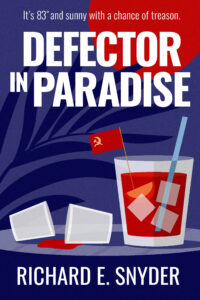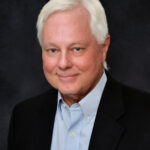Novelist Richard E. Snyder chats with me today about his new spy fiction, Defector in Paradise.

Bio:
Richard Snyder is a former intelligence officer and a new author of espionage fiction. The author knew from an early age that he was destined to work in the field of intelligence. Let’s just say it was part of the family business. But what he didn’t learn until years later was the moral and emotional chaos involved in a life of clandestinity, and the remarkable storytelling culture that comes from those who walk across the dark stage. Both attributes are hallmarks of his first two novels, The Clandestine Education of Owen Roberts, and Defector in Paradise.
Richard Snyder is a graduate of the College of William and Mary and a dedicated reader of fine spy fiction. He travels extensively, enjoys landscape photography, and is an avid fan of our national parks. He and his wife live in Florida, and have a son who is a successful advertising executive living in the Netherlands.
Welcome, Richard. Please tell us about your current release.
Defector in Paradise is the author’s second novel in the Owen Roberts’ trilogy. It happens to be an election year, and a Russian agent is just a step away from making it to the White House. Tragic circumstances force Owen Roberts to team with a cagey Soviet defector to expose one of the Cold War’s last and biggest secrets: the identity of a high-level mole operating within the US government.
As Owen walks down a violent path of death and destruction, he realizes that he has become the last man standing between the mole and the White House. What follows is a high-stakes game of cat and mouse fought at the highest levels of the intelligence community, but the question is: who’s the cat, and who’s the mouse?
At its heart, Defector in Paradise is more than just a spy thriller, it is a novel about the unimaginable manipulation of American politics, and the actions of those who refuse to believe truths they cannot accept. Owen Roberts teaches us that the truth can set you free, but sometimes it’s better just not to know. The truth, after all, is the most dangerous weapon of all.
What inspired you to write this book?
I wanted to write a political/spy thriller similar to The Manchurian Candidate with the same theme of hidden political manipulation. I wanted to demonstrate that we, as a country and as individuals, are never really free from the politics and the secrets of the past, and how easy it can be under the right circumstances for bad actors in the espionage universe to corrupt our officials and influence our political process.

Excerpt from Defector in Paradise, from the chapter, DMITRI ASNAROV:
What was it like to watch the USSR crumble into small pieces like a stale cake being eaten by a child, to watch as the great communist empire disappeared into thin air like some cheap magic trick? What was it like when the scientific theory of socialism and Marxism/Leninism were revealed to be giant hoaxes that destroyed millions of Russian lives and crippled human progress for over half a century?
What was it like when his only son—a decorated tank driver and young hero of the Soviet Army—was killed in Afghanistan two weeks after he was supposed to return to the Soviet Union, his return delayed so his replacement, the son of a Communist Party big shot, could finish his vacation on the shores of the Black Sea?
What was it like when all the old spies in East Berlin began going crazy, with the Wall tumbling down, the mobs taking over the streets, and everyone trying to make a deal to save themselves, offering their services and information to the highest bidder?
What was it like to have been clairvoyant, to have had the sense of these things, of a future unraveling, to have begun copying files of KGB agents operating in Germany years before the storm hit?
Was it the final straw when his wife said, “Enough, I’m going back to Moscow,” and he was left with nothing but an empty life? Was that when he decided to defect? Or was it a moment of exhilarating liberation, the moment he’d waited for his entire life, the only chance he’d ever have to live the rest of his days as a free man?
Owen put down the last file of Dmitri’s operational dossier and pushed his chair away from the table. Yes, he wondered, what would it have been like for him to have his entire life clinically examined by strangers? To hand deliver the motherlode of secrets, the names of KGB agents from the Russians’ clandestine source registry in Karlshorst—the agents responsible for going after American military officers in West Berlin, the ones subverting West German secretaries and NATO officials with booze, broads, and boyfriends. And then afterward, to be polygraphed relentlessly, assessed, tested, and judged, for that was the price of entry into the land of milk and honey. And then to have his every word scrutinized for signs of falsehood, deceit, and fakery, to make sure he was not a KGB plant, the agent provocateur that James Jesus Angleton had warned everyone in the Agency about decades ago.
Owen leaned back in his chair, closed his eyes, and crossed his arms. He could not help feeling that Dmitri’s handlers had missed something over the years. Yes, they knew the date Dmitri had first approached the Americans in West Berlin, but what was missing was the moment he decided to make the terrifying leap in his own mind. When did he decide, for Christ’s sake? That’s what Owen wanted to know. What was it that finally drove him over the brink, to leave everything behind? His handlers said he was out to save his own skin, that Dmitri wanted an escape hatch like everyone else in those days, and the time to do it was when the Iron Curtain was being ripped apart as easily as a sheet of paper.
Owen had spent the past two weeks at Langley, reviewing the files on the defection, resettlement, and handling of Dmitri Asnarov, a KGB officer for seventeen years. He had not found the answer to his questions in the thousands of pages he had read, but did it matter? He was not there to poke holes into the reason for Dmitri’s defection; after all, what was the point? He was going to Florida to keep an eye on the guy.
What exciting project are you working on next?
The third and final chapter of the Owen Roberts’ trilogy. The novel is still under concept development and will be called Red Lines. It will take place in the future as an American president decides to invade Iran to stop the mullahs from crossing the nuclear threshold. The dilemma is that the intelligence on Iranian nuclear capabilities is not as clear as the public thinks, and Owen Roberts is forced to step into the breach one more time to find out which source is telling the truth.
When did you first consider yourself a writer?
In my mind, I became a writer after editing my first novel for what seemed like the twentieth time, and realizing it was finally good enough for someone else to read. I had finally met my own standards, but I still needed an editor to apply the final gloss. For me, becoming a writer was about putting imagination and storytelling first, followed by the hard work of ruthless editing, of challenging every word, every paragraph, and every page to achieve clarity and pace, and to make sure that the characters, dialogue, and plot lines all fit. My first drafts were terrible, and I knew it, but I also knew I just had to let the ink flow and put words to paper to get started and find my voice.
Do you write full-time? If so, what’s your workday like? If not, what do you do other than write and how do you find time to write?
I do my sports and exercises in the morning, take a lunch break, and write in the afternoons when my body and brain feel relaxed. When I am really focused on my writing, it seems like three hours can go by in the blink of an eye.
What would you say is your interesting writing quirk?
The main protagonist in my trilogy — Owen Roberts — is not your traditional hero. He is more of an anti-hero who is just trying to find his way through the moral hazards of espionage without hurting innocent bystanders. He’s a quirky character in his own right and I surround him with other quirky characters and plot twists that you might not find in more traditional spy novels.
As a child, what did you want to be when you grew up?
I was lucky because I always knew what I wanted to do – work in intelligence.
Anything additional you want to share with the readers?
I am a new author, but the more I write, the better I’m going to get. Red Lines is going to be a blast!
